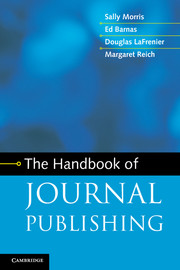Book contents
- Frontmatter
- Contents
- Preface and acknowledgments
- 1 Introduction to journals
- 2 Managing journals
- 3 Editing
- 4 The production process
- 5 Journal metrics
- 6 Marketing and sales
- 7 Fulfillment
- 8 Journal finances
- 9 Subsidiary income
- 10 Contract publishing
- 11 Copyright and other legal aspects
- 12 Ethical issues
- 13 The future of scholarly communication
- Appendix 1 Glossary
- Appendix 2 Resources
- Appendix 3 Vendors
- Index
- References
11 - Copyright and other legal aspects
Published online by Cambridge University Press: 05 March 2013
- Frontmatter
- Contents
- Preface and acknowledgments
- 1 Introduction to journals
- 2 Managing journals
- 3 Editing
- 4 The production process
- 5 Journal metrics
- 6 Marketing and sales
- 7 Fulfillment
- 8 Journal finances
- 9 Subsidiary income
- 10 Contract publishing
- 11 Copyright and other legal aspects
- 12 Ethical issues
- 13 The future of scholarly communication
- Appendix 1 Glossary
- Appendix 2 Resources
- Appendix 3 Vendors
- Index
- References
Summary
While copyright provides the legal underpinning for much of what journal publishing does, it is far from being the only area of law which is relevant. Contract law governs the whole range of agreements, from full-blown contracts (e.g., between a publisher and a journal’s owner, or between the publisher/owner and the Editor) to agreements with individual authors; licenses (whether for a whole country, or for an individual user), and subsidiary agreements with third parties, are contracts too. The issue of libel may arise (for example, in book reviews). Another area of law which is increasingly important, as personal records of authors, reviewers, and others are generally maintained on computer, is that of data protection.
All of these areas of the law are governed by national laws, which vary somewhat (although within the European Community they operate under the overall umbrella of European law); in this chapter we aim to bring out the main differences between US and UK/European law. Further detail of the national differences can be found at http://portal.unesco.org/culture.
Copyright
What is copyright?
Copyright is what it says – the right to copy. It provides the copyright owner with the exclusive right to make copies, and to permit (or not to permit) others to make copies (in whatever medium) and to “communicate them to the public” – i.e., to distribute or publish them. It also covers the right of rental or lending; performing, showing, or playing the work in public; including in a collection (e.g., an anthology); and making an adaptation (e.g., a translation).
- Type
- Chapter
- Information
- The Handbook of Journal Publishing , pp. 318 - 357Publisher: Cambridge University PressPrint publication year: 2013



